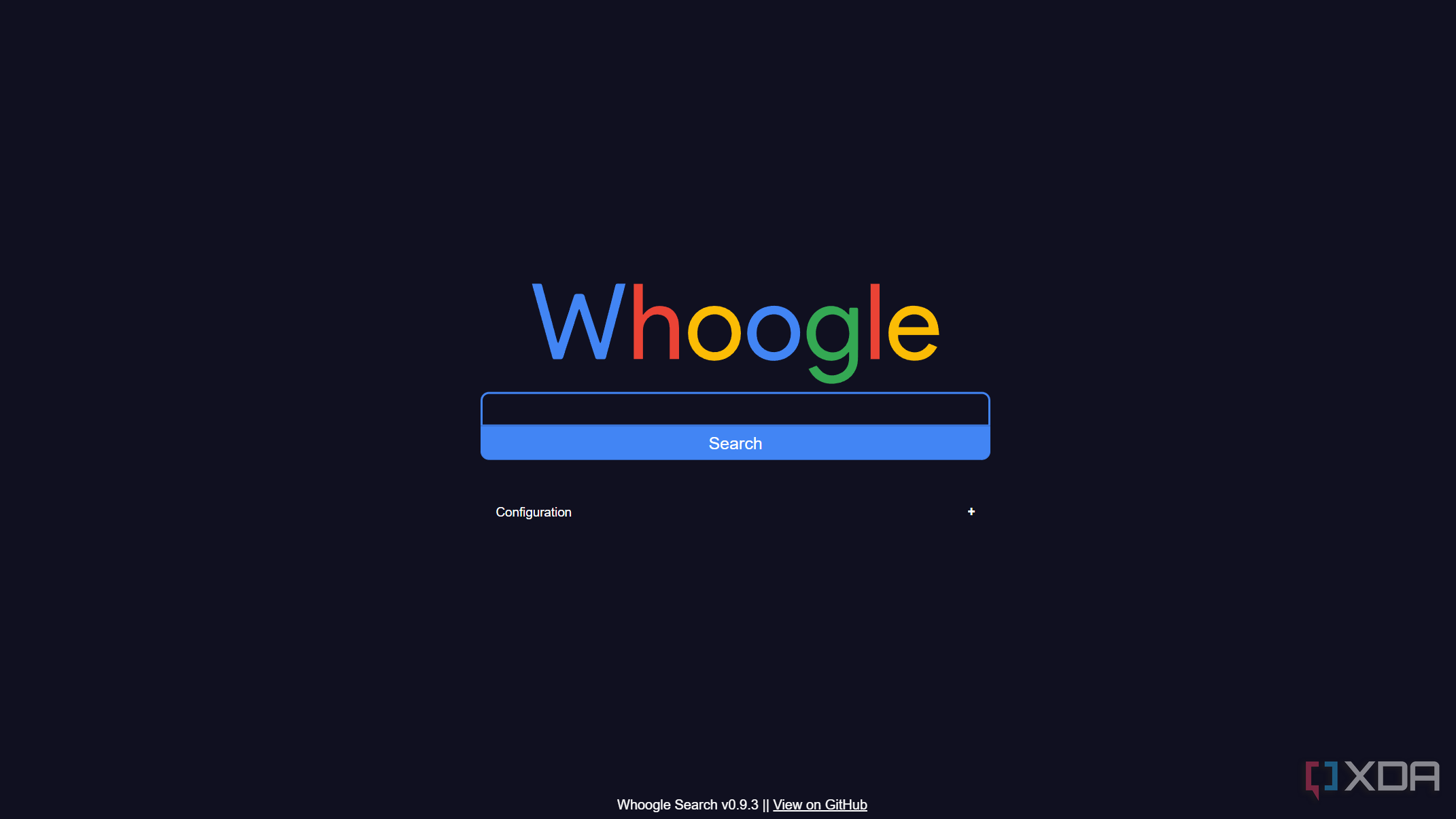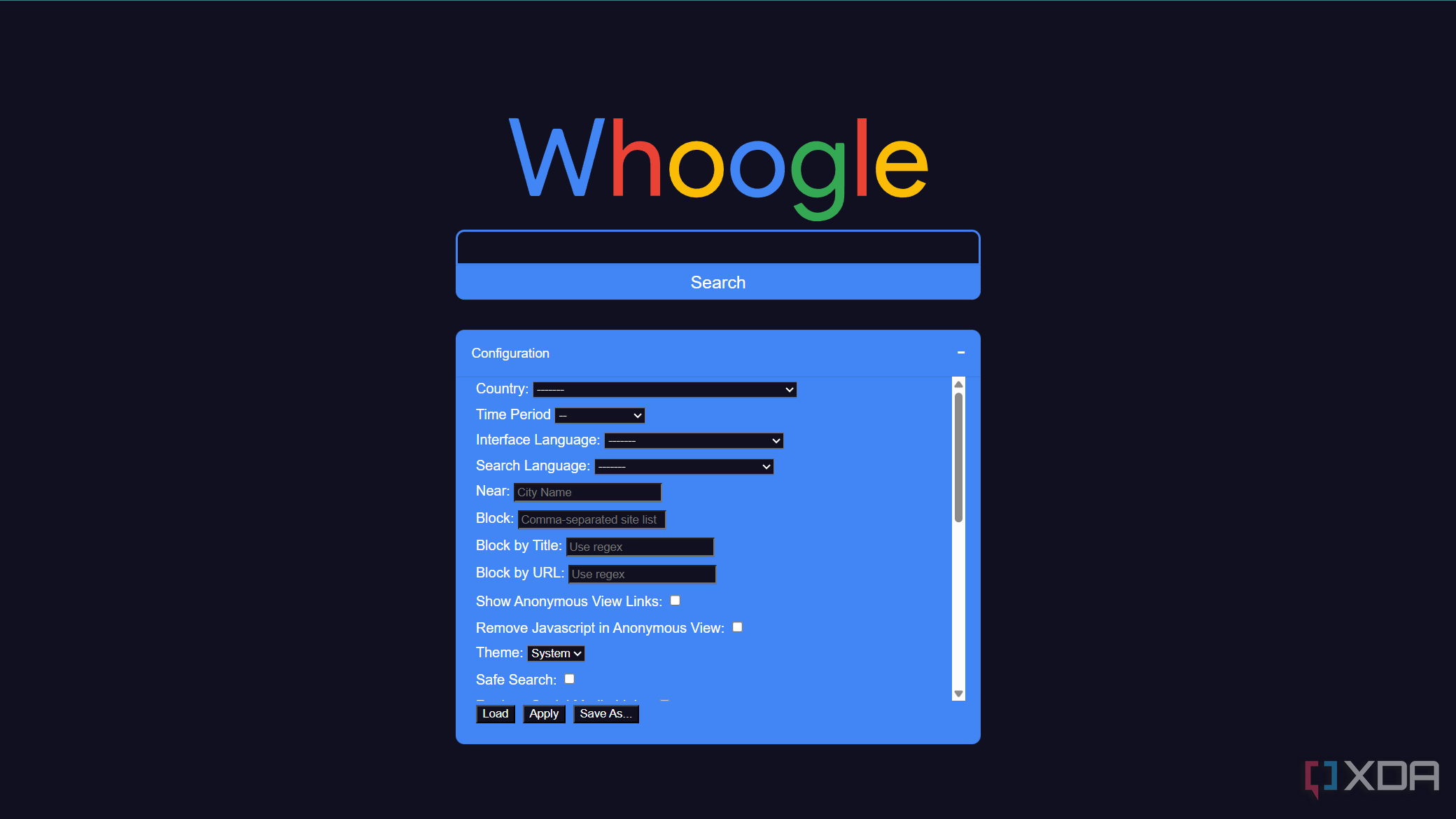While there are plenty of privacy-focused browsers to choose from, as well as search engines that block trackers, you may come to miss Google Search if you’re used to its ability to comprehensively surface links. That said, Google Search has gotten significantly worse over the years, prioritizing sponsored links while Google hoovers up as much data as possible.
But what if you could access Google’s search indexing without all the sponsored nonsense? That’s where Whoogle comes in.
Related
Should you use a self-hosted search engine?
What are the options and benefits in self-hosting a search engine?
What is Whoogle?
A self-hosted app that makes Google Search more private
Whoogle is a self-hosted web app that allows you to get search results, but without the usual ads, third-party JavaScript, AMP links, and third-party cookies that Google Search has. The aim is to provide less cluttered and more privacy-focused results.
While the Whoogle Github page says that a change to Google Search may be a breaking change for Whoogle. However, we tested an instance of Whoogle and were able to confirm that it still works.
There are also a variety of ways to configure your searches in Whoogle, allowing you to block certain websites, enable SafeSearch, and adjust your User Agent. Once you’ve set up Whoogle on a private server, you can also adjust your default search engine in certain browsers to use your Whoogle instance instead.
Whoogle focuses on easy deployment
User-friendly and convenient
There are other self-hosted metasearch engines out there, but Whoogle is designed to be as easy to deploy as possible. As the platform’s FAQ on Github notes:
“Whoogle is intended to only ever be deployed to private instances by individuals of any background, with as little effort as possible.”
The dev notes that this means that technically-minded users might be more interested in Searx since it offers more configuration options. You can easily configure Whoogle in the web UI, but you can’t change the search engine to Bing, for example.
I’m still relatively new to self-hosting, and setting up Whoogle in Docker Desktop was very easy. In fact, the most time-consuming part of the process was trying to get WSL to mount the right folder to clone the repository — only for me to realize I’d left out a slash in the command.
Trying Whoogle versus Google Search
The differences stack up
The most noticeable difference when using Whoogle versus Google Search is the lack of AI Overviews. I personally try to avoid Google’s AI-powered summaries as much as possible due to inaccuracies and hallucinations. While there are ways to disable AI search summaries, Google keeps making that more difficult to do. But you don’t need any tricks to get results without AI summaries when using Whoogle. You will still receive featured snippets, however.
When I compared the results between Google and Whoogle using Chrome, other differences weren’t as prominent. However, this was likely due to my ad blocker filtering to some extent, even when I set it to no filtering. I switched over to a newly installed version of Brave with no extensions, and here I could see the differences more easily.
The sponsored shopping links that often come with broad searches like “mechanical keyboard” were not in Whoogle, but took up most of my Google Search window. While shopping links can be useful if you’re looking for a certain product available locally, I’ve found that the results are weighted more in terms of whether they’re sponsored. For example, when searching for a mechanical keyboard, the shopping links weren’t only littered with a ridiculous number of Temu products — but they also included results for membrane keyboards.
Likewise, when searching for plus-size clothing, Google’s links were filled with Shein results. Since Whoogle doesn’t have these sponsored results, the results included focused more on local brands that offer plus-size clothing. You might wonder why I wouldn’t want my search engine to track that I was looking for this clothing, but that’s because it sometimes results in adverts for weight loss and dodgy supplements that aren’t helpful when you’re a person with chronic illness.
But what was that I said about local results? It’s important to note that when Whoogle submits the search to Google, Google still receives an IP address from your instance. If you want to protect your IP address, it’s better to deploy Whoogle to a Virtual Private Server (VPS). I’d also recommend using Whoogle in addition to a privacy-focused browser and a VPN to further protect yourself from tracking.

Related
I ditched Chrome years ago, here are 5 open-source browsers I recommend instead
There are better options out there
Whoogle provides you with a simple, self-hosted search
I’ve been dabbling with alternative search engines to avoid the many drawbacks of Google’s results. While my mobile browser and search has been replaced with Brave, I’m glad I’ve tried out Whoogle as well. I hope the project continues since it’s one of the most user-friendly ways to deploy an ad-free search engine.


